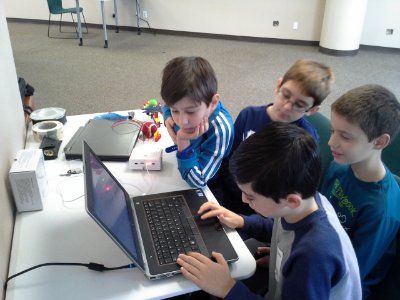Dr. Allen Selis, Director of TECH Edventures
Are all those smart screens making our kids less...smart? It depends on how long we're glued to them and what we do when we're offline.
Last week's published findings in The Lancet, one of the most respected medical publications in the world, reminds us that not every digital, flashy device is good for your kids. But you knew that already, right!?

First, the obvious: Kids who spent more than two hours a day in front of screens had lower ability levels in critical areas like language skills, memory, planning ability, and cognitive speed. Why should this be so obvious? It's a classic education issue.
Kids learn using their bodies: When children are learning, they use every part of their brains to take in information or solve problems, including the parts that govern speech, movement, artistic expression and even song. When kids stay glued to computer screens, they stay in a two-dimensional zone that actually shuts down important parts of the brain that are responsible for learning. If you'd like an earful on this, check out neuroscience expert Gabrielle Principe's book Your Brain on Childhood.
Wait...At TECH Edventures you teach coding. Now your want kids to avoid computer screens? Actually, we're more about balance. The TECH Edventures curriculum offers hands-on exercises at the earliest (K-2) level of our curriculum. What makes our work with kids so important is that we've brought years of experience with early-elementary education to the challenge of equipping kids for a high-tech world. Our most important lessons happen when...surprise...we close the computer screens and invite kids to use their whole bodies to explore new concepts, discuss with peers or build things from scratch.
We know that our kids are marching rapidly into a digital world. At TECH Edventures, we think that technology education should be part of a whole-child approach which includes healthy choices all around.
So what does a healthy diet of brain activity look like? According to the Lancet, if your kids are 8-11 years old, they should get at least 60 minutes of exercise a day, sleep 9-11 hours a night and spend no more than two hours in front of a screen per-day. Kids who did this scored 4% higher on a range of intelligence and attention tests. Short story: Your kids can keep their computers...but find time to shut-down once a day for soccer practice.
Dr. Allen Selis is the founder of Tech EdVentures, a Dallas based startup that teaches engineering and coding skills for children from Kindergarten through 8th grade. You can reach him at Allen@techedventures.com or @TechEdv on Twitter. You can also learn more about coding and engineering curriculum for schools at STEM Crafters!

